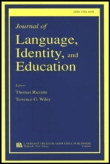
Journal of Language Identity and Education
Scope & Guideline
Bridging Language and Identity in Educational Practices
Introduction
Aims and Scopes
- Language and Identity Intersections:
The journal emphasizes research that investigates how language use intersects with identity formation, particularly in multilingual and multicultural contexts. This includes exploring the identities of teachers and learners and how these identities influence language learning and teaching practices. - Diverse Educational Contexts:
The scope includes studies conducted in various educational settings, such as K-12, higher education, and community-based programs. It focuses on the role of language in shaping educational experiences and outcomes for diverse populations, including marginalized groups. - Translanguaging and Multilingualism:
A significant focus is on translanguaging practices and multilingualism, exploring how these concepts challenge traditional language boundaries and contribute to identity negotiation within educational frameworks. - Critical Perspectives on Language Policy:
The journal aims to critically analyze language policies and their implications for identity and education, looking at how policies affect language use and cultural identity in educational settings. - Narrative and Qualitative Research Methodologies:
Research published often employs narrative and qualitative methodologies to capture the lived experiences of individuals navigating their identities in relation to language learning and teaching.
Trending and Emerging
- Identity and Social Justice in Language Education:
There is a growing emphasis on the intersection of language education and social justice, exploring how language practices can empower marginalized communities and challenge inequities in educational settings. - Translanguaging as an Educational Practice:
Research focusing on translanguaging—where bilingual individuals draw on multiple languages in communication—is increasingly prevalent. This trend highlights its role in identity negotiation and as a pedagogical tool that enhances learning experiences. - Impact of Digital Literacies on Language Identity:
Emerging studies are investigating the influence of digital literacies on language identity, particularly how online platforms and social media shape language use and identity construction among learners. - Teacher Identity in Multilingual Contexts:
There is a rising interest in the identities of language teachers in multilingual classrooms, examining how their personal and professional identities affect their teaching practices and interactions with students. - Narratives of Language Learners:
An increasing number of publications focus on the narratives of language learners, emphasizing personal stories and experiences that reveal the complexities of language learning and identity formation.
Declining or Waning
- Traditional Bilingual Education Models:
There is a noticeable decline in research centered around traditional bilingual education models, which have been overshadowed by more dynamic approaches such as translanguaging and critical bilingualism. The shift indicates a move towards understanding bilingualism as a fluid and context-dependent phenomenon rather than a fixed model. - General Language Teaching Strategies:
Research focusing solely on generic language teaching strategies without the integration of identity or sociocultural factors appears to be waning. The journal increasingly prioritizes studies that connect language pedagogy with identity construction and social justice. - Static Language Ideologies:
Themes centered around static language ideologies, which view language as a set of fixed rules or norms, are declining. The journal is moving towards more nuanced discussions of language as a dynamic and evolving entity influenced by identity, culture, and context.
Similar Journals
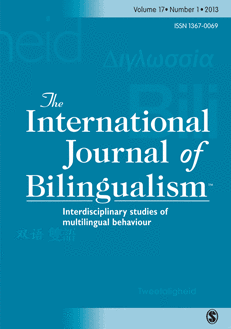
International Journal of Bilingualism
Transforming language policy with rigorous research.The International Journal of Bilingualism, published by SAGE Publications Ltd, stands as a distinguished forum within the fields of Education and Linguistics, boasting an impressive Q1 ranking in both categories as of 2023. Since its inception in 1997, this journal has been at the forefront of bilingualism research, contributing to a deeper understanding of language use, acquisition, and policy in multilingual contexts. With its ISSN of 1367-0069 and E-ISSN 1756-6878, the journal serves a global audience of researchers, educators, and students dedicated to advancing knowledge in bilingualism. The journal is recognized for its rigorous peer-review process and high impact, indicated by its Scopus rankings, which place it in the top percentile among its peers. Although currently not offered as open access, the International Journal of Bilingualism remains an essential resource for cutting-edge research and dialogue in the dynamic field of bilingual studies, thereby significantly impacting educational practices and language policy decisions worldwide.
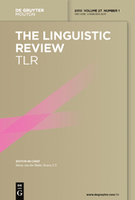
LINGUISTIC REVIEW
Elevating the Discourse on Language and Society.LINGUISTIC REVIEW is a prestigious academic journal published by De Gruyter Mouton that has established itself as a leading platform in the field of Linguistics and Language. With an impressive impact factor and categorized in the Q1 Quartile for the year 2023, this journal ranks within the top tiers of its discipline, indicating its influential contributions to linguistic research. Covering an extensive range of topics from theoretical frameworks to applied linguistics, the journal aims to foster scholarly dialogue and advance the understanding of language in its myriad forms. Researchers and students alike will benefit from the rigorous peer-review process and the availability of in-depth studies published from 1981 onwards. While the journal is not open access, it is renowned for its exceptional quality and relevance in both the Arts and Humanities and Social Sciences classifications, with Scopus rankings placing it in the top percentile of its peers. By offering insight from leading scholars, LINGUISTIC REVIEW remains an indispensable resource for those who are passionate about linguistic inquiry and its real-world applications.

Al-Arabiyya-Journal of the American Association of Teachers of Arabic
Cultivating a Community of Arabic Language ScholarsAl-Arabiyya: Journal of the American Association of Teachers of Arabic, published by Georgetown University Press, serves as a significant platform for research and scholarship in the fields of Arabic language education, linguistics, and literature. With its ISSN 0889-8731 and E-ISSN 2375-4036, this journal presents a robust blend of original articles, reflections, and pedagogical research aimed at both seasoned educators and emerging scholars. While the journal is not an open-access publication, it maintains a commendable impact in its categories, achieving Q4 in Education and Q2 in Literature and Literary Theory as per the latest rankings. Notably, it has been recognized within Scopus for its contributions to the arts and humanities, with rankings that reflect a vibrant academic discourse surrounding the Arabic language. Al-Arabiyya aims to promote and enhance the teaching and learning of Arabic while fostering an understanding of its literary and cultural richness, making it an invaluable resource for anyone interested in Arabic studies.
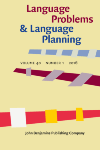
Language Problems & Language Planning
Fostering Dialogue on Language Issues Across BordersLanguage Problems & Language Planning is a pivotal scholarly journal published by John Benjamins Publishing Co, renowned for its contributions to the fields of linguistics, communication, and language studies. With an ISSN of 0272-2690 and an E-ISSN of 1569-9889, this journal has been a cornerstone of academic discourse since its inception in 1977 and will continue to serve as a vital resource until 2024. Currently, it holds a respectable position within the Q3 category in both Communication and Linguistics and Language, reflecting its significant impact in these areas. The journal focuses on the intersection of language-related challenges and planning, addressing critical issues that affect societies worldwide, making it essential reading for researchers, policymakers, and students alike. Although it does not offer Open Access options, its articles provide valuable insights supported by a rigorous peer-review process, fostering a diverse dialogue among scholars and practitioners. Recognized in the Scopus rankings, Language Problems & Language Planning offers a platform for original research and theoretical discussions that advance understanding of language issues in a globalized world.
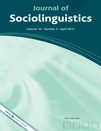
JOURNAL OF SOCIOLINGUISTICS
Unraveling the Complex Tapestry of SociolinguisticsThe Journal of Sociolinguistics, published by Wiley in the United Kingdom, is a leading interdisciplinary journal that explores the intricate relationships between language and society. With an impressive impact factor reflecting its Q1 quartile ranking in Histories and Philosophy of Science, Linguistics, Philosophy, and Sociology, this journal is recognized for its scholarly contributions, making it a vital resource for academics and practitioners in these dynamic fields. Covering a wide scope of topics from language variation and change to sociocultural dynamics, the journal has converged from 2004 to 2024, ensuring a comprehensive understanding of contemporary sociolinguistic issues. Although operating under a traditional access model, the Journal of Sociolinguistics remains pivotal for advancing critical dialogue and research for professionals, researchers, and students invested in linguistic and sociological studies.

Language Policy
Illuminating Language's Role in Society and PoliticsLanguage Policy is a prestigious journal published by Springer, dedicated to the critical examination of language policy across various sociopolitical contexts. Since its inception in 2003, it has rapidly evolved into a leading platform, currently holding a Q1 status in both Linguistics and Language and Sociology and Political Science categories as of 2023. Nestled in the Netherlands, this journal aims to foster interdisciplinary dialogue, providing insights into the intricate relationships between language, culture, and governance. With a commendable impact factor and an impressive ranking in multiple Scopus categories, it is particularly valuable for researchers and professionals seeking to explore current trends and emerging issues in language policy. The journal does not offer open access, ensuring high academic standards and curation of quality research while appealing to a broad audience of academics and industry practitioners. Explore the multifaceted world of language policy through rigorous analysis and impactful studies presented within Language Policy.
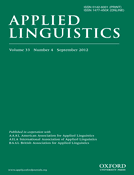
APPLIED LINGUISTICS
Exploring the Nexus of Language and SocietyApplied Linguistics, published by Oxford University Press, is a premier scholarly journal that has significantly contributed to the fields of linguistics and communication since its inception in 1980. With an impressive impact factor and ranked in the top quartile (Q1) in both Communication and Linguistics and Language categories, Applied Linguistics is recognized for its rigorous peer-reviewed articles that explore the intersections of language, society, and cognition. The journal enjoys a remarkable position in the Scopus rankings, placing it among the top 2% of publications in its discipline. Researchers, professionals, and students benefit from its comprehensive scope, which encompasses innovative research on language acquisition, discourse analysis, and applied linguistics methodologies. Although not an open access journal, its commitment to advancing knowledge and fostering academic discussions makes it an indispensable resource for anyone interested in the critical role of language in various contexts.
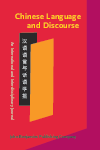
Chinese Language and Discourse
Advancing Understanding in Language and DiscourseChinese Language and Discourse, published by John Benjamins Publishing Co, is an esteemed peer-reviewed journal focusing on the fields of linguistics and language, as well as the visual arts and performing arts. With its ISSN 1877-7031 and E-ISSN 1877-8798, the journal is recognized for its rigorous scholarly contributions, achieving notable rankings within its categories—Q2 in Linguistics and Language and Q1 in Visual Arts and Performing Arts as of 2023. Based in the Netherlands, the journal serves as a vital platform for researchers and professionals seeking to explore the intricate interplay between Chinese language and discourse practices, contributing to the understanding of cultural and communicative phenomena. The journal is accessible for subscriptions, encouraging a wide readership eager to engage with contemporary debates and research insights in these dynamic fields. By bridging linguistic analysis with artistic expression, Chinese Language and Discourse fosters a multidisciplinary dialogue that is essential in today’s interconnected academic landscape, making it an indispensable resource for students and scholars alike.
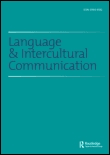
Language and Intercultural Communication
Advancing Understanding in Linguistic DiversityLanguage and Intercultural Communication is a leading peer-reviewed journal published by Routledge Journals, Taylor & Francis Ltd, based in the United Kingdom. With an ISSN of 1470-8477 and an E-ISSN of 1747-759X, this esteemed publication has established itself as a vital resource in the fields of Communication and Linguistics, boasting an impressive Q1 classification in both categories as of 2023. The journal's scope encompasses a broad range of topics related to language and its role in intercultural contexts, making it an essential platform for researchers, professionals, and students alike who wish to contribute to and learn from the latest scholarly discussions. Even without an open-access option, its high impact factor and strong Scopus rankings, which place it in the 87th percentile for Linguistics and Language, affirm its significance in shaping contemporary dialogue. As we move towards 2024, Language and Intercultural Communication continues to foster academic exchanges that challenge, expand, and enrich understanding across diverse linguistic and cultural landscapes, making it a must-read for anyone interested in the intersection of language and culture.
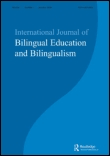
International Journal of Bilingual Education and Bilingualism
Illuminating the path to effective language acquisition.The International Journal of Bilingual Education and Bilingualism is a premier publication dedicated to advancing the field of bilingual education and language acquisition. Published by Routledge Journals, Taylor & Francis Ltd, this UK-based journal features a robust collection of research articles, reviews, and theoretical discussions, making it essential reading for educators, linguists, and policymakers. With an impressive impact factor that underscores its influence, it holds top quartile rankings in both Education and Linguistics and Language categories for 2023, reflecting its high-quality content and academic rigor. The journal covers pivotal topics from bilingual teaching methodologies to the cognitive implications of multilingualism, catering to the needs of a diverse and global audience. Its Scopus ranks further emphasize its esteemed position within the academic community, ranking 18th in Language and Linguistics and 21st in Social Sciences’ Linguistics. By providing insights into contemporary challenges and innovations in bilingual education, the International Journal of Bilingual Education and Bilingualism continues to be a vital resource for researchers, professionals, and students alike, inspiring new directions in bilingual education research.